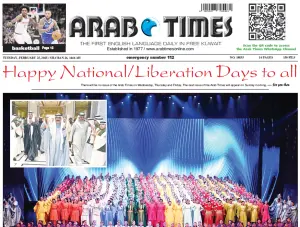24/04/2021
24/04/2021
The Lebanese film ‘Where Do We Go Now?’, by the distinguished director Nadine Labaki, is considered one of the best Arab films.
The film, which I watched ten years ago and forgot most of the events unfolding in the movie, revolves around the love story that brings together the Christian girl ‘Amal and the Muslim ‘Rabea’ which is represented by the proximity of the church and the mosque in a remote Lebanese village difficult. The residents of the area follow the two religions of the Book and live peacefully away from the fire of sectarianism which today burns big cities and villages of their homeland.
One day, a resident buys a TV set and the entire village that once lived in harmony go when they listen to the news of the sectarian war going on in their country.
With the increase in the frequency of sectarianism followed by inciting speeches by men of the village in front of the television screen, rift begins to appear in their peaceful live and the Muslims and Christians erect barriers among them to prevent each sect clashing with the other or the use of weapons.
Only the women of the village, of the two religions are hurt by what is happening, so they decide to develop plans to distract men from politics and to prevent a sectarian clash between them, so they decide to take an initiative and give up their female pride and bring dancers from Europe to distract their husbands.
They also sought to insert hashish and hypnotics into the bread they made for them. The events of the film reach its climax with Umm Ali who shoots her son in the foot to prevent him from taking revenge on the son of the other sect for the killing of his brother.
When the women feel desperate and disappointed about the situation, they decide to take a radical solution to the situation, with each one changing her religion to the religion of the other and placing the men in front of the fait accompli. If they want to kill the followers of the other sect, then they should start with their wives.
The film ends with the death of a woman in the village and they carry her coffin to bury her. They are confused about which of the two cemeteries to choose, is it the religion she was born with or the religion she converted to, and everyone wonders: Where to go now?
And since Nadine Labaki temporarily stopped directing, just as every artiste the creativity in Lebanon stopped, and the hours of power cuts increased, fuel oil disappeared, and the bread became scarce and the water springs began to dry up, and none of the adults accepted the idea of resigning; there is no guarantee that those who come after them will be better than them and less corrupt.
There is no glimmer of hope on the horizon of the imminent arrival of international aid, or an upcoming tourist season, or even something like that.
There is no hope for new elections, nor is there any dependence that the “people’s” options to do away with the sectarian indicator. There is no hope in a military coup, and it will fail if it takes place. There is no willingness to concede to the other side, and there is no glimmer of hope in a popular revolution.
We shout with the remaining lovers of Lebanon: Where do we go now?
e-mail: [email protected]
By Ahmad alsarraf


